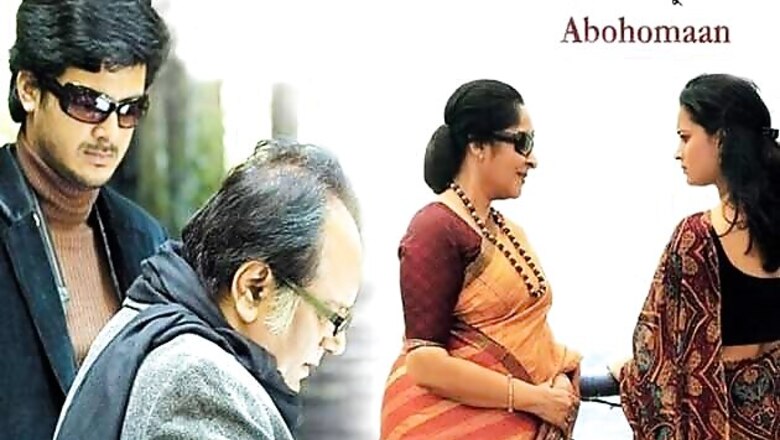
views
"One can see more layers in Abohomaan (The Eternal) than my previous film Shob Charitro Kalponik," declared Rituparno Ghosh just before the screening of his latest film at MAMI. The statement was potent enough to spark the curiosity of the audience sitting inside the theatre. For those who had seen Shob Charitro… it was a challenge thrown at them by the confident filmmaker, who was sure to floor his fans with his latest offing. For those, who had missed out on the previous one rather decided to enjoy the film they had come for.
Once again Rituparno chose his favourite subject – filmmaking - as an intrinsic part of his storytelling. Abohomaan revolves primarily around four characters associated with the art in some way or the other.
Dipankar Dey plays Aniket, a reputed art house director. The opening shot shows an ailing Dipankar muttering incoherently about different aspects of filmmaking as he watches Jisshu clicking pictures of the surrounding hilly terrains. Jisshu, who plays his son Apratim, pleads him to take some rest.
Though Jisshu comes across as a caring son and Dipankar a doting father, we could immediately sense their strained relationship; something was definitely amiss.
For a fleeting second one could catch a glimpse of Amitabh Bachchan of The Last Lear in Dipankar.
Cut to the next scene and we get the news of Aniket's sad demise. Rituparno zeroed in on this awkward moment to introduce the rest of the characters in the film. Strange but true, the impact was bang on.
The focus shifts on Sreemati, a reputed actress, who is terribly miserable with the news and the media hounding her for bytes.
The story then goes into a flashback. We see Mamata Shankar playing Aniket's devoted wife Deepti. Aniket had fallen in love with Deepti during the audition of his dream project, Nati Binodini, and they got married. For some reason the project couldn't take off. But never mind …
Years later, Aniket decides to revive Nati Binodini with a new actress. And there comes Shikha, the outspoken, unsophisticated, unrefined yet beautiful aspiring actress Shikha (Ananya Chatterjee).
It didn't take Deepti too long to give up her career for her husband's and for their son Apratim. There were moments when she felt she has lost a little of who she was in the process. But she was happy.
The plot becomes intriguing when a reluctant Aniket auditioned a young actress Shikha and the inevitable happened. It was Deepti who kept pushing Aniket into giving Shikha one chance.
Little did she know her innocent gesture would backfire and shatter her happily married life… It was Deepti who led Aniket into the trap set up destiny. Interestingly Shikha has an uncanny resemblance to young Deepti. Deepti takes it on herself to coach Shikha for the role - so much so that Shikha with proper grooming becomes more like Deepti with each passing day. As a result an aging Aniket falls in love with her, someone as young as his son.
The film certainly has many layers. One hand we find the 'Pygmalion concept' dexterously embedded in the Shikha-Aniket episode, the kind of bond Nati Binodini shared with the legendary Girish Chandra Ghosh who is still considered the father of the modern Bengali stage.
Abohomaan is also about the two women (Deepti and Shikha) bonding on the same character, working towards the same goal.
The film had generated a buzz when a few people close to the director insisted similarities between late Oscar winning filmmaker Satyajit Ray's personal life and Aniket's character. Apparently, Ray too had some issues with his wife and son. But Rituparno has vehemently rubbished the point saying it's strange that whenever there's scope of a potential romance in the storyline, people start dragging in real names.
Whatever be the reality, the film boasts of some beautiful moments like Shikha pouring her heart out to Apratim; Aniket supporting his son despite his insolent behaviour, trying to explain his situation to Deepti in his own calm manner. In fact, he poses an interesting question when Deepti confronts him. He asks, "Isn't it possible that both of you co-exist in my life?" You actually feel for the man and his predicament and yet tend to get judgmental knowing Deepti's plight.
Abohomaan doesn't have too many symbolisms and dream sequences like Shob Charitro Kalponik, but skates closer to The Last Lear in emotional quotient. As in Shob Charitro… Rituparno again uses the same technique of switching between past and the present.
Dipankar Dey in the film has definitely given one of the best performances of his life. Mamata Shankar was good as usual. Jisshu who seems to have become a permanent fixture in Rituparno films showed maturity. Riya Sen, who debuts in this Bengali film, is okay. Ananya Chatterjee deserves a special mention for her brilliant histrionics – both as unsophisticated Shikha and later as successful actress Sreemati.
Verdict: Watch it for Dipankar Dey and Ananya Chatterjee's fantastic performances.
Rating: 3.5/5



















Comments
0 comment